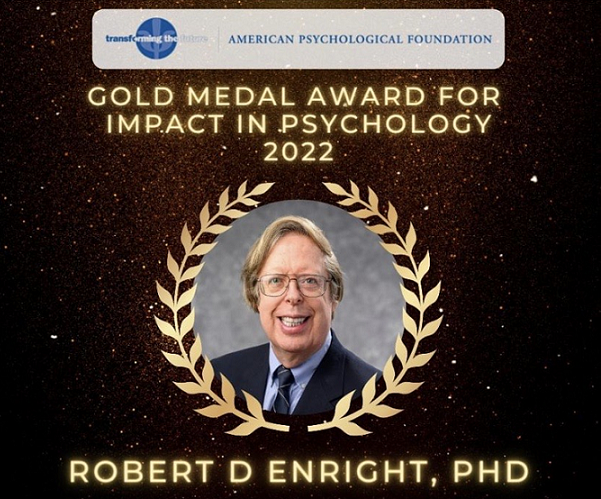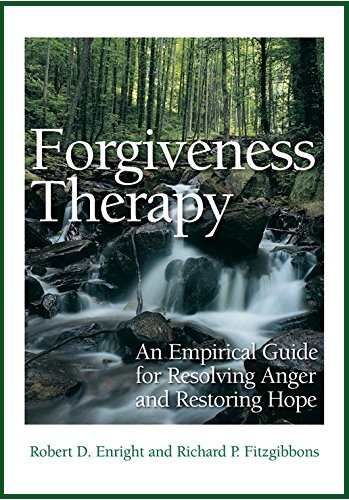Tagged: “Forgiving”
I hear such expressions as “State and Trait Forgiveness” and “Specific Forgiveness vs. Dispositional Forgiveness.” Are there really different forms of forgiving?
I think this dichotomizing of forgiving is a philosophical error. “State” forgiveness refers to individual people forgiving specific people who have hurt them. “Trait” forgiveness refers to individual people having a general tendency to forgive many other people for many different offenses. Aristotle reminds us that as each person grows in any moral virtue through practice (and forgiveness is one of those moral virtues), then there is a tendency to develop a love of that virtue. As the person develops this love of forgiveness then there is a tendency to forgive others whenever there is an injustice. So, “Trait” or “Dispositional” forgiving occurs when a person first has a lot of practice with specific forgiving toward specific people. Such a person eventually shows a maturity in how this now is understood, valued, and expressed. Forgiveness should not be dichotomized into “State and Trait” forgiveness. Instead, we should see these as being on a continuum, with the love of the virtue appearing after a period of struggle and time.
I have been reading some of the social scientific literature on forgiveness and I am a bit confused. I see a lot of different definitions of forgiveness out there. Is forgiveness more than one thing?
To forgive another is a moral virtue of being good to those who are not good to you. I am going to give you a little philosophy here based on Aristotle. He made the distinction between what he called the Essence of any moral virtue and the Existence of that virtue. Essence asks this question: What is the objective meaning of forgiveness that is consistent across cultures and across historical time? Existence asks this question: How does the fundamental sense of forgiveness (that is fixed across cultures and historical time) have nuances for each person and within different cultures? So, there is a fixed definition of what forgiveness is (its Essence) and yet it can behaviorally vary according to each person’s ability to forgive and according to different cultural norms for expressing forgiveness (its Existence). The differences in the definition of forgiveness (its Essence) within the social scientific literature is caused by different researchers having different views of forgiveness (including misunderstandings of what forgiveness is) and not something inherent within forgiveness itself.
Sorry for being so blunt, but it seems to me that forgiving is an act of slavery to the ones who behave badly. It gives the unintended message that I am too soft in my response to the one who hurt me. What do you think?
I think you are equating forgiving and automatically reconciling without asking anything of the one who hurt you. As you forgive, you can and should ask for fairness.
Forgiveness Research Goes Viral
Surging world-wide interest in the virtue of forgiveness was vividly demonstrated this week when the International Forgiveness Institute (IFI) released updated distribution totals for its prized Forgiveness Research Tools.
In just the past 17 months, the IFI has fulfilled requests for 717 copies of its Forgiveness Research Tools–requests received from individuals and research organizations in 41 countries and 43 US states plus the District of Columbia. The IFI began offering the tools for free on April 1, 2021.
The forgiveness tools were developed by IFI co-founder![]() Dr. Robert Enright and his associates through the Enright Forgiveness Lab that he established at the University of Wisconsin-Madison. Dr. Enright has validated those scientific measuring tools and used them in more than 50 forgiveness research projects he has conducted at locations around the world since 1993.
Dr. Robert Enright and his associates through the Enright Forgiveness Lab that he established at the University of Wisconsin-Madison. Dr. Enright has validated those scientific measuring tools and used them in more than 50 forgiveness research projects he has conducted at locations around the world since 1993.
By far the most popular and most requested forgiveness tool (223 requests) is the Enright
Self-Forgiveness Inventory (ESFI) that “captures the Aristotelian view of forgiveness as a moral virtue practiced toward the self.” According to Dr. Enright, the tool is based on the premise that “self-forgiveness is a moral virtue, not a psychological technique.”
Close behind in requests (201) is the Enright Forgiveness Inventory-30 (EFI-30)—a shortened version of the Enright Forgiveness Inventory for Adults that has become the interpersonal forgiveness measure tool of choice for research professionals since its development in 1995.
Two other forgiveness tools developed by Dr. Enright are also extremely popular:
- The Enright Forgiveness Inventory for Children—an objective measure of the degree to which one person forgives another who has hurt him or her deeply and unfairly (125 requests); and,
- The Enright Group Forgiveness Inventory—a newly-developed research tool that takes forgiveness from its traditional focus on individuals to a higher magnitude by concentrating on group forgiveness—an area of intervention that has dramatic implications for its ability to enhance peace efforts in the world (109 requests).
Dr. Enright is a licensed psychologist and an educational psychology professor at UW-Madison who pioneered the scientific study of forgiveness. He wrote the first scientific journal article on person-to-person forgiveness, is often introduced as “the father of forgiveness research,” and has been labeled “the forgiveness trailblazer” by Time magazine.
 In 2019, Dr. Enright received the international Expanded Reason Award from the Universidad Francisco de Vitoria and the Vatican Foundation Joseph Ratzinger/Benedict XVI and he holds the Aristotelian Professorship in Forgiveness Science (2020) from UW-Madison. Earlier this year he was awarded the 2022 American Psychological Foundation Gold Medal Award for Impact in Psychology. His work integrates psychology, philosophy, and psychotherapeutic disciplines.
In 2019, Dr. Enright received the international Expanded Reason Award from the Universidad Francisco de Vitoria and the Vatican Foundation Joseph Ratzinger/Benedict XVI and he holds the Aristotelian Professorship in Forgiveness Science (2020) from UW-Madison. Earlier this year he was awarded the 2022 American Psychological Foundation Gold Medal Award for Impact in Psychology. His work integrates psychology, philosophy, and psychotherapeutic disciplines.
Dr. Enright’s 37-year quest to harness what he calls “the power of forgiveness” has resulted in the development of curriculum guides for students at each level from pre-kindergarten through 12th grade that are now being used in more than 30 countries around the world.
His groundbreaking clinical manual Forgiveness Therapy, developed with psychiatrist Dr. Richard Fitzgibbons through the American Psychological Association, is the basis for the world’s first online forgiveness education course for psychologists, social workers, nurses, and other professional counselors. It is offered exclusively through the IFI.
developed with psychiatrist Dr. Richard Fitzgibbons through the American Psychological Association, is the basis for the world’s first online forgiveness education course for psychologists, social workers, nurses, and other professional counselors. It is offered exclusively through the IFI.
“When I first began exploring the virtue of forgiveness, I was unable to find a single scientific journal article on forgiveness that had been published anywhere in the world,” Dr. Enright recalls. “Today there are literally hundreds of such articles and based on the demand for our research tools, that number will soon be growing exponentially.”
Dr. Enright’s forgiveness research tools are available free upon request at the International Forgiveness Institute website: internationalforgiveness.com or via email: director@internationalforgiveness.com.
Speed and Forgiveness
I will try to be brief.
Speed. You can see it in the driving as the very rare few people actually adhere to the posted speed limit these days.
Speed. You can see it as you watch people walking on the street, phone in hand, scrolling, scrolling, scrolling. I wonder how long the average person stays on one topic within that phone.
Speed. Have you noticed the new trend on Facebook?: reels. These are, what?, maybe 10 seconds each? 10 seconds to view a video…….
Speed. Have you seen those commercials on the Internet, promising you weight loss at night as you sleep if you take a certain kind of pill? At night? With no exercise? And immediate results?
Speed. I have seen such statements as, “Forgive in 6 easy steps.”
Speed. It is in contradiction to what it means to grow as a person. To grow as a person is to slowly improve in the virtues, first identified by Plato as justice, or giving your best with your gifted qualities so that the community is better off and in harmony with others. This takes time to develop your gifted qualities. Forgiveness, as a moral virtue, is crafted with three things: practice, practice, practice. It takes effort and time and struggle to be good to those who are not good to you. It even takes time to deeply understand what forgiveness is and what it is not so that you do not confuse it with excusing wrongdoing or automatically reconciling or throwing justice under the bus. There is no such thing as the forgiveness pill that will reduce resentment as you sleep.
Speed and forgiveness. I have come to realize that they are not compatible and so I am concerned about the new norms of speed, shifting focus quickly, and a lack of required attention. The new norms may be getting in the way of our forgiving well and therefore of living well with others.
I say in my classes at the university: Whenever you try to improve something, you always create a new problem. Do not see only the improvement but also scrutinize the new problem to see if the new improvement is worth embracing. We have quickened our world as we get to destinations faster by car, as we see what presents our friend in a distant land got in the birthday party today, as we are entertained with a 10-second video……..but what is the problem created? We are in danger of becoming way too superficial, way too unfocused, way too unchallenged, and miss perseverance, miss growing in the moral virtue of forgiveness, and miss the golden opportunity of growing in our humanity and in assisting others in such growth.
Speed has its place. It just should not have primacy of place.
![]()



